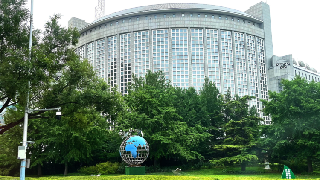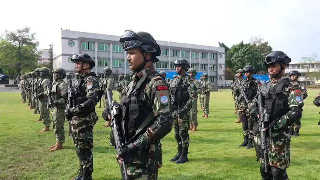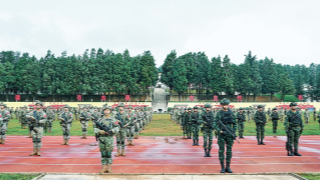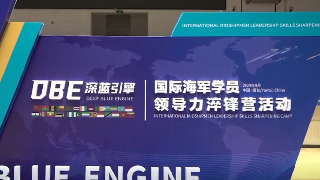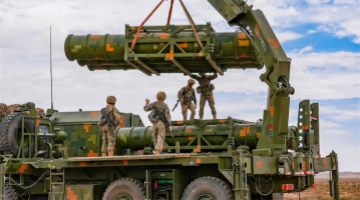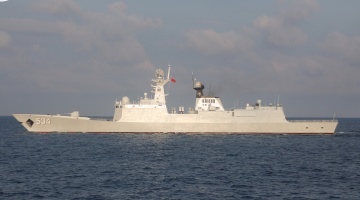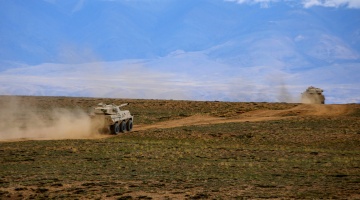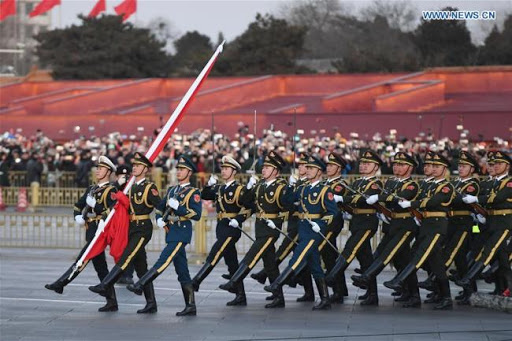
The CPC's Absolute Leadership over the Military
On August 1, 1927, the forerunner of the PLA, led by the CPC, held an uprising in Nanchang city, which marked the CPC had established its own military, six years after its own founding. The PLA, under the leadership of the CPC, fought numerous battles and wars, and through an arduous struggle of 22 years defeated enemies from both within and outside the country and founded the People's Republic of China on October 1, 1949. Since then, the PLA led by our Party has been the staunch pillar of the people's republic, a great wall of steel in defense of the motherland and an important force in socialist construction. And loyalty to the CPC is the soul and lifeblood of the PLA and the reason why the PLA can overcome difficulties and achieve victories. The history of China's revolution and construction has proved that, the Party's absolute leadership over the military is the fundamental guarantee of its sovereignty, security and development interests, and its long-term stability and the people's happiness. Therefore, it is determined by the country's specific conditions and the CPC's progressiveness, as well as an essential trait of the socialism with Chinese characteristics, and a major political advantage of the Party and the state. "China will continue to uphold and improve the Party's absolute leadership over the armed forces and ensure that they will faithfully fulfill their missions in the new era", as reiterated by the CPC Central Committee in October 2019.
The "Defensive" National Defense Policy
The socialist system of China, the strategic decision to follow the path of peaceful development, the independent foreign policy of peace, and the best of cultural traditions - considering peace and harmony as fundamentals - determine that China will pursue a national defense policy which is defensive in nature. In July 2019, the Chinese government issued the white paper entitled China's National Defense in the New Era. The white paper offered the most authoritative explanation on China's defensive national defense policy in the new era, provided a panoramic view on the historic achievements made in the defense and military development of the country, and expounded on Chinese military's propositions, practice and contributions to world peace. "China will stay as determined as ever to build world peace, contribute to global prosperity and uphold the international order", said President Xi Jinping, who is also general secretary of the CPC Central Committee and chairman of the Central Military Commission (CMC). The PLA will remain a staunch force for world peace.
Shared Destiny, Boundless Love
Since the outbreak of the COVID-19 epidemic, the PLA sent out more than 4,000 medical workers to support Wuhan and recorded zero infection during their mission in the frontline. Putting people's life and health as the greatest priority, the PLA has implemented the overall principle of shoring up confidence, strengthening unity, ensuring science-based control and treatment and imposing targeted measures. At the same time, the PLA actively joined hands with international community in fighting the pandemic. Medical supplies have been sent to the armed forces of nearly 50 countries including Bangladesh. With profound sincerity and efforts, the PLA has been working together with partners around the world to overcome the difficulties and has made substantial contribution to the global fight against Covid-19. To follow President Xi Jinping's call for the building of a community of common health for mankind, the PLA is willing to continue making concerted efforts with the armed forces of Bangladesh and other countries around the world to enhance international cooperation in epidemic prevention and control.
CPLA - a Force of World Peace
This year marks the 30th anniversary of the PLA's participation in the UN peacekeeping operations. Over the past 30 years, more than 40,000 Chinese "blue helmets" have been dispatched to conflict-affected countries and areas in 25 UN peacekeeping operations. 15 Chinese peacekeepers have laid down their lives for the cause of world peace. At present, there are more than 2,500 PLA troops serving in seven UN mission areas around the world. China is not only a principal fund contributor to the UNPKOs, but also the largest troops contributor among the permanent members of the UN Security Council. The Chinese peacekeepers have been hailed by the international community as "a critical factor and key force of peacekeeping operations".
The 35th PLA naval escort fleet, composed of the guided-missile destroyer Taiyuan, the missile frigate Jingzhou and the supply ship Chaohu, left the port city of Zhoushan for the Gulf of Aden and waters off Somalia to escort civilian ships, on April 28th, 2020. Since 2008, the PLA Navy has regularly deployed more than 100 vessels and 26,000 personnel to the escort missions, and provided protection for nearly 7000 ships in over 1300 operations, half of which were non-Chinese commercial ships.
The Chinese armed forces have been actively expanding their military cooperation with other countries. The PLA is participating in many missions such as humanitarian aid, disaster relief and other international activity. Since it entered service in 2008, the PLA hospital ship Peace Ark has visited 43 countries to provide medical services, benefiting more than 230,000 people. It is worth noting that the Peace Ark has visited Chattogram, Bangladesh twice, respectively in 2010 and 2013.
Over the past year, the PLA successfully held the Multinational Naval Events marking the 70th founding anniversary of the Chinese PLA Navy in Qingdao, the International Army Games-2019 in Korla, the 7th Military World Games in Wuhan, and the 9th Beijing Xiangshan Forum, in which China was committed to promoting peace through cooperation, and safeguarding development through peace. The PLA also participated in various joint military exercises, such as "Cobra Gold-2020", "Golden Dragon 2020", etc, to strengthen the strategic mutual trust, cooperation and exchanges between China and different countries, and to enhance their capability in jointly tackling international security threats.
Stronger China-Bangladesh Military Ties
China and Bangladesh have a long history of friendship. Military ties have always been a pillar of the Sino-Bangladesh relationship. In recent years, cooperation between the two armed forces has grown steadily and rapidly, with frequent high-level visits, deepening exchanges and increasing number of personnel training. In October 2016, President Xi Jinping made a historical visit to Bangladesh and upgraded the bilateral relationship to the Strategic Partnership of Cooperation. In July 2019, Prime Minister Sheikh Hasina paid a successful visit to China, which maintained new momentum of cooperation between the two countries. China is ready to work with Bangladesh to implement the important consensus reached by the leaders of both sides, strengthen strategic communication, expand cooperation in personnel training, equipment and technology, disaster relief, peacekeeping and other fields, pushing for new development of relations between the two countries and their armed forces.
Peace is an aspiration for all peoples, and development is an eternal theme of humanity. Faced with global security challenges that are becoming ever more intricate and choices that have to be made at a crossroads of human development, China firmly believes that hegemony and expansion are doomed to failure, and security and prosperity shall be shared. China will remain committed to peaceful development and work with people of all countries to safeguard world peace and promote common development.
- Li Jiming is the Chinese Ambassador in Dhaka
Disclaimer: This article was originally produced and published by bangladeshpost.net. View the original article at bangladeshpost.net.

?


